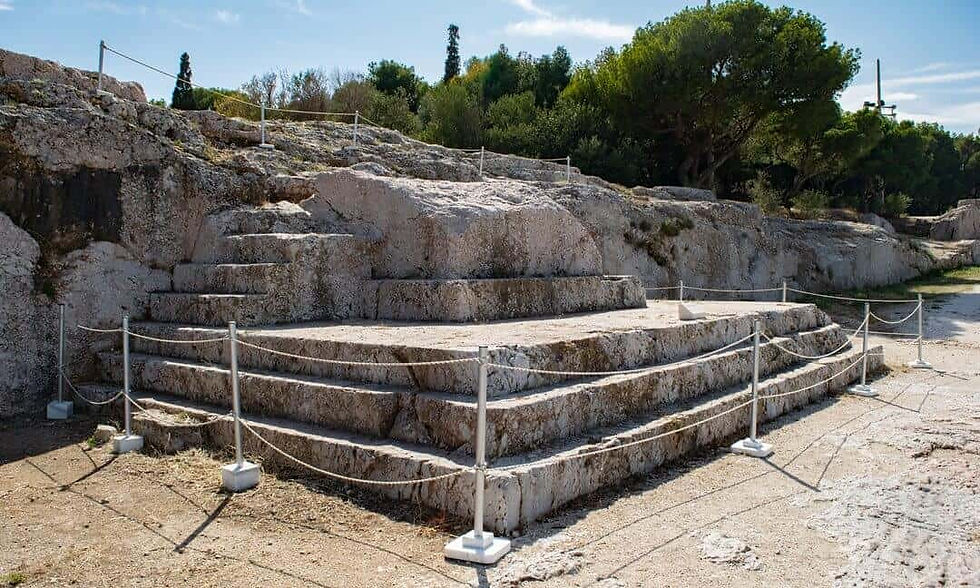Pnyx
- kristenlpowell
- Jun 4, 2020
- 3 min read
Updated: Jun 26, 2020
The Pnyx stands as the official meeting place of the Athenian democracy. Here, citizens gave speeches regarding political happenings in Athens.

What we see here is known as the Orator's Bema; any citizen could technically present at the Pnyx, but few took advantage of this opportunity. Originally, the Pnyx was set up in an orientation where the Acropolis was behind the speaker. This allowed the audience to view the speaker in a more dignified light because he would have been backed by their most prominent architecture; this orientation also allowed the speaker to not only speak to the audience but also the whole city of Athens. However, the Acropolis proved to be a distracting background for the audience, leading to the reversal of the orientation of the site. We see Cyclopean-style walls surrounding the Pnyx, even though they weren't typical of the time period the site was built during. This choice of architecture was most likely to give the site a feeling of dignity that commanded respect from the citizens of Athens.
A cornerstone of democracy in Athens
It is estimated that the Pnyx was used as early as 507 BCE. The timeline of the site aligns with Cleisthenes's reforms to democracy, which transferred the power in familial ties to power in the Demes. A Deme is similar to a neighborhood, and each Deme had 3 sectors: one in the neighborhood or village, one in the city, and one by the sea. This system allowed the Athenians from different backgrounds to work closely with each other in their governmental system.
Pnyx could hold about 6,000 people which would have been only about 10% of the city state's voting population, but this was seen as satisfactory for most assemblies. Only Athenian citizens were allowed to vote; in order to earn citizenship, one had to be a son of two Athenians and have completed 3 years in the Athenian army. The Athenian citizens were essentially required to take part in the voting, and other aspects of the government. A citizen who was not involved in the government was termed an "idiotes," meaning a private person who did not participate in public affairs. This is the foundation of the word "idiot" that we use today; the term has evolved to generally mean a person who is not intelligent. Over the years, participation in politics has been equated with intelligence.
"We do not say that a man who takes no interest in politics is a man who minds his own business; we say that he has no business here at all." - Pericles
Reflection
While Athenian democracy is the foundation of the democracy in place in the US today, there are also key differences. One difference is that most offices in ancient Athens were determined by election by lot, essentially meaning chosen at random; this being said, there were some positions, like military generals, that were elected by vote. Another such difference is the requirement of participation in voting. Athens strived to keep their people involved in the government; every single citizen was required to be informed and engaged, and to participate in the government by voting and fulfilling positions that they were elected by lot to. Their direct democracy reflected this goal of having everyone involved, and it ensured that all citizens felt as though they had a place within the governmental structure. Many eligible citizens in the US do not vote today. For some abstaining is a conscious choice, while others face difficulties getting to the polls. When entertaining the idea of mandatory voting, there are many aspects that should be taken into consideration. I definitely think mandatory involvement would encourage some to make a more active effort in becoming more educated and engaging in conversations that help them to further develop their political understandings. We might even integrate political classes in our school system with the goal of help students work through their beliefs and better understand policies. This would seem to have the effect of reducing the number of US citizens who are apathetic and neutral towards our political system. However, we must also consider that mandatory voting may lead to more uneducated votes from people who are voting only out of an effort to fulfill the requirement. There is always room for improvement, and our government is no exception; Oftentimes great ideas for improvements can come from history.



Comments